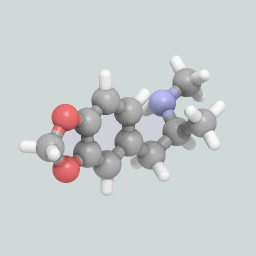 Pic: Animated image of MDMA.
Pic: Animated image of MDMA.MDMA, or ecstasy is a popular 'party drug' with a fascinating history. Currently, it is most often associated with raves.
From Science Daily:
There exists a direct relationship between the consumption of MDMA, or Ecstasy, at a high ambient temperature and an increase in the neural damage which this drug provokes. This was the conclusion of the research carried out by Beatriz Goñi at the School of Pharmacy of the University of Navarra.The study was done on rats who were given MDMA:
...at ambient temperatures of 15, 21 and 30 degrees centigrade. After performing the pertinent analyses, she demonstrated that metabolism of Ecstasy is accelerated by higher ambient temperatures at the time of administration. In addition, higher ambient temperatures also increase, in the same proportion, the neurochemical deficit that affects the brains of the users of this drug.Unfortunately, MDMA is already documented to have several health risks. Especially of concern in in psychiatry is the long term damage to serotonin density and activity.
From wikipedia:
Serotonin is believed to play an important role in the regulation of anger, aggression, body temperature, mood, sleep, vomiting, sexuality, and appetite. Low levels of serotonin may be associated with several disorders, namely increase in aggressive and angry behaviors, clinical depression, obsessive-compulsive disorder (OCD), migraine, irritable bowel syndrome, tinnitus, fibromyalgia, bipolar disorder, anxiety disorders[citation needed] and intense religious experiences[1].Tough to treat, too.

No comments:
Post a Comment